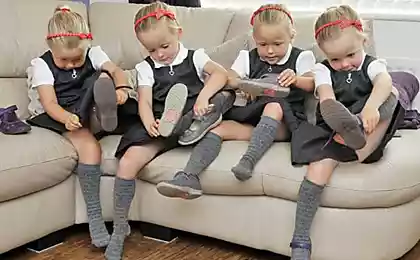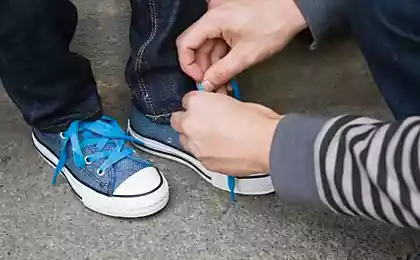746
Ekaterina Burmistrova: 8 problem child in school
As the child to form a correct perception of the learning process? To help whether and how to prepare homework? As problems with homework can damage relations between parents and child? All these questions are very often in consultations to hear a psychologist and mother of many children Ekaterina Burmistrova.
Of the undone lessons to conflicts in the family
Preparation of homework basic practice in the days of our growing up was this one: "You will do lessons, but if you have difficulty – you ask me and I will help you". Now the whole system of education in the primary school is designed for what parents should do homework with your child.
And then there is a dilemma: how to make so that the child successfully mastered the curriculum, despite the fact that:
Teachers, by default, assume you are the entire elementary school will be responsible for the quality and quantity of homework. If the task of the teacher was to teach, now the task of the teacher is to give the task, and the task of the parents (presumably) these tasks to perform.
Foreign language programs are generally structured so that the child in principle can not do without an adult. Rude: "I do Not understand – the fool. I explain the material, and if the child does not understand something or go to extra classes, or explain parents." For this situation, you need to be ready.
So, parents should sit down and do homework with the first grader, second grader, third grader, a fourth grader. But now, maturation occurs quite early, and in the 9-10 years we can observe all the symptoms of adolescence. By the 5-6 class this opportunity is to sit and do homework with your child – you have lost. This situation will be impossible, but in four years the child will get used to it, what kind of class responsible mother and he himself the responsibility can not take and can not.
You can price the loss of a relationship continue to make years to 14-15, while forces will suffice. The conflict will be delayed for several years, and the child is still not able to take responsibility for their tasks. In 14-15 years the protest is already very bright and with severance of relations.
There are some indicators that children who were almost the best students in elementary school, because they did everything mom and dad, in high school reduce study, because help make is not ready, and skills to learn – no.
This system, imposed by many primary school teachers – that the child did everything at home perfectly, that is with the help of parents.
If a child falls behind, the teacher can show parents claim: negotiate! Only the old experienced teachers adhere to the classical system – the child did all the work, even with errors and are ready to teach and correct.
"How are we doing?"
The formation of the correct training of a stereotypeyou Need to understand what kind of teacher you have to deal with, what's his position. And, depending on the rigidity of this position, to bend the line of independence.
The most important thing you can teach your child in elementary school, is responsibility, ability to work and the ability to perceive the assignment as their own.
First, if you move in the direction of formation of independence training, you performance will be lower. Particularly acute lack of independence formed the only children in the family, and they need to be especially careful.
The child writes his first hooks and immediately subjected to pressure from parents: "don't go there took the pen! You scoff at us! You're gonna be a janitor!". The level of motivation the child has a low level of motivation of the parents is off the charts.
A school teacher says: "Why the child beyond the connection of letters?". Won't you come to the teacher, and he makes you learn with your child. Explaining the material in school, he suggests that you will regularly engage and obtain advice on what to do. And formed a stable lexical bundle "How are we doing?", talking about the ongoing symbiosis between mother and child. Then, class at 9, the child says: "I don't know what I want to be," he has not developed the feeling of being in a study.
If the child all the time to insure he'll never learn to do anything yourself, he knows that "mommy will think of something" in any situation parents will find a way.
But parents often there is a fear: "will Not result if schooling to autonomy in confrontation of the child with the teacher, with the system?"
First may be the lag, but then the child achieves success. There is an initial loss, but no loss in class 4-5. If in this period, the performance of artificial honors plummets, then these children's performance increases dramatically.
There are children who still need help. Children chronically broken, the child is "not here" in his thoughts (although within normal range).
These children need more help. If the child has in principle the ability to organize themselves, they need to include. The issue with the lessons is very simple: either he takes responsibility for them, or not take.
The picture is quite early, even with "training". It is better to create the conditions for the emergence of independence, and the need to build the right training stereotype associated with the lessons.
School characters
If teachers muchyour Child can easily get used to one teacher, who leads several items. If the teachers are different, we need to help the child to Orient, “the name kind of lady.” Aunts are different, they have a middle name, and first-graders with the middle name deal with difficulty – it is difficult to remember, difficult to pronounce.
There may be a kind of home training: cut out the figure of aunt so-and-so – she leads the math, call her so.
It should also help the child to learn the names of classmates. Until the child knows the names of classmates and teachers, he feels uncomfortable.
Focusing on the ability of the child, to help remember “school of character” – children and adults, is an important parental task.
Daily careStudent must help to organize the learning processIf you have a family there are children, the household chores, if you have at least some semblance of a schedule or rhythm of life, there are some daily chain of events that is repeated (at about the same time stand up, at one time lie) – the child will be easier to get used to the school rhythm.
Household chores are taught to take on daily responsibility. And there are very nice flowers and Pets, garbage removal – what you need to do regularly. The flowers are visibly dry, cats meow and ask for a drink, and trash do not use. Adults should not “save” the child and not to perform the duties instead.
Time to hit the school the child should be regular duties that he does every day: brushing his teeth, makes his bed, folds his clothes. Against this background, to domestic duties increase other daily duties – school.
Student helpful:
1. To be able to collect things for classes in the sections and put down the briefcase. This is a must do in the year before school – at least. In boys this generally turns out worse than girls.
First, the child will do it with your help, with a prompt sequence. While the child reads, can be hung on the wall painted list of what should be in the portfolio. If a child forgot something, you never have to correct him if he once will be with a missing subject, but be able to remember that.
2. If you know that the child will still forget something at home, you can also check the portfolio. "Let's check, whether you have collected. Show me all there is in the portfolio."
3. To know where are clothes and shoes for school. He must evaluate if it's clean clothes or dirty, dirty to clean dirty Laundry. There is also formed a liability: it's very easy to see your clothes for stains.
4. "Children's time management": not only to assemble a portfolio, but more to come in time for class. This is a basic skill, without which the beginning of learning in school very difficult. To form this skill, which will be stupnicki to the next, also need not in 1st class, and the year before it, when the classes are quite relaxed and not in the morning.
5. To know what days is what training. This is good to use the calendars. Can be under days to write what it is in the day classes, paint them different colors, the child knew exactly what to collect.
If you are not able to give your child all of these skills to school, do the same thing in 1st grade.
How to do homeworkSchool time managementto do your homework, there should be a certain time. Need a daily schedule: get up, wash up, dress up – the outline of the day and the time devoted to doing homework. Child easier when all rhythmically. Occurs dynamic stereotype (according to Pavlov) – system response time: the child in advance is preparing to move to the next step.
Such a system is simpler for approximately 85% of children who are classified as "rhythmic". There is a 15% Butrimovich, with chaotic temporal dispensation. You can see them from infancy, they remain so and to the school.
After school should be an hour of peace (this rule should be observed), and then there may come a time lessons.
The child can show the schedule of the Pope, mom's weekly planner, and then write his schedule, explaining what you do, and this is an attribute of adulthood. All the attribute of adulthood, all preferably.
One of the diseases of modernity, lessons that stretch for an inordinate amount of time. This means that people are not made of simple actions to help the child and yourself.
1.It is necessary to know that the child has no sense of time. 6-7 year old child because as adults, does not feel, he does not know how much time passed.
2.The longer the child sits for the lessons, the lower his efficiency.
Norm-making lessons for a first grader:
40 minutes – 1 hour.
Class 2 – 1 hour – 1.5 hours
Grade 3-4 – 1.5 – 2 hours (not 5 hours)
by the 5-6 class this rule goes for 2-3 hours
but more than 3.5 hours should not be wasted on lessons.
If the child makes the lessons longer, it is not taught to work, or he's a chronic "brake", and their especially well have to learn to work. The child does not feel time, and parents need to help him feel.
Adequate time making lessons for the first grade – 20-25 minutes for kindergartners even less – about 15 minutes, for children depleted – maybe even less.
But if you child seated on time more than you need, you're just wasting your time and his, and his. With lessons you can not help, but with "time management" still stands.
In order to feel the time, there are different ways to help the child. For example, different types of timers:
you can be an hourglass (not suitable for dreamers – dreamers will look like spilling sand);
– can be electronic devices that will beep after a certain time;
sport watch, which has stopwatch, timer, pre-programmed signals;
– kitchen timers;
– recorded on a phone sound of the school bell.
In the preparation of homework, plan for its implementation. Usually begin with the lesson that is given quite easily. First made writing assignments, and then oral. Start with what is easy; the child is produced – a break.
The child worked hard, need a change of activities, the break: ran to the kitchen, you squeezed the juice and drank it; smeared my sandwich; five times, ran around the table; did a few exercises – switched.
But the workplace of the child – not in the kitchen. He has to be a certain place, and in the kitchen you can come to "the break". You need to teach the student to include the working place in order. Good environment training places – is very important. Should be a place for toys, a place to sleep, a place to study, you can organize even 4 years.
You agree in advance that if the child do their homework during this hour, you then have a lot of things: read a book, play a Board game, draw something make, view a favorite movie, take a walk, whatever you like.The child should be interesting and profitable to do lessons during this time.
Time making lessons – preferably before it gets dark. After school, recreation. Not to leave after lessons on circles, while you do not build up skill. To get the additional classes (pool dancing), you need to learn how to do homework quickly and efficiently. If you do, there will be no stretch on the rest of the day.
If the night is limitless, and lessons you can do to rebound, the situation of the "donkey": he stood up, rested, no good, do not scold severely – you can not do. Usually children realize they don't have all day to spend on this boring mission, but there is something else in life. It is important that life does not end with going to school: first day of classes, and the second lessons to night, and the child used it all spread out like semolina on a plate, and nothing else can not think. Usually temporal boundaries and some good effects work perfectly.
The final consequences must be changed periodically: Board games to replace the hearing of the tale or something else pleasant. In the chart of the day go first class, and then – free time, i.e. starts its life, and its lessons to the mix is not necessary.
Lessons with enthusiasm?What is homework? A continuation of what happened in school or private houses?
Psychologically this is training skills: in the class explained, and the houses themselves worked. If there is a strong failure, it is best to treat this as something, then life begins. To expect enthusiasm from a child no need (although there is separate children – potential movers). We must learn to treat the lessons as an intermediate stage, even a fun – job, and then will be happy. If not formed another stereotype (lessons until very late with tears and swearing), then this is enough.
Assignments cannot be duplicated (to contribute beyond a given) – they should be small to preserve the desire to learn, the child is not overworked. All "re-" much more dangerous than "half-assed".
Usually the child is able to keep himself at a table for 15-20 minutes, and there is a skill to doing the lessons quickly. If the child does not have enough time, and the mother sitting over him, catches it and forces you to continue, then the student receives a negative experience. Our goal is not to torture the child, and to let him know that he missed something.
If the child to school faced with the constraints of time – in some classes, he was going or doing some specific activity in a clearly designated time frames, he had already formed some skill.
The first encounter in the 1st grade with these complex temporal skills can be a big problem. Better to start with "training", and even better with 5 and 5.5.
If assignments in school do not ask, you still need to offer your child to do some net jobs for some time alone.
The parents themselves also do not need to show excessive enthusiasm, and to sit over the soul. We are all very worried about the success of our child, and the reaction to errors can be restless – and relations deteriorate.
You need to tune that not everything will be perfect, that there will be mistakes, but gradually they will be less.
Encouraged by the lack of evaluation in the 1st grade. While forming the skills of doing homework, the child himself is tightened, the 2nd class is included, and the grading system at once puts everything in its place. You have to give to make a mistake. Perfect expectations that once everything is "excellent", you need to keep.
It must be very praise when the child has assumed independence, praising for what he was doing, tried. Praise is not the result but the effort. From every parent's strictness to the school's success is perceived as a blow to the ego. In high school, the child understands already that if a parent scolds, he wants goodness. Junior high school student perceives criticism as a blow: "I'm trying, and you're here saying something against...". Orient the effort.
Well, if the teacher is also inclined to appreciate the effort, not success. But unfortunately, many teachers believe that censure is the best way to advance man to great success.
Special situations1. A special difficulty if the child in 1 class immediately begins English.
If you have chosen a school, it is best to start English in the year before school. This is very much load – mastered from two writing and two grammar at the same time. With the preparation of homework English help is a must. It is desirable that he was a tutor and teacher. If a parent wants to teach their child, it is necessary to keep good mood, not angry, and if it's not to the detriment of the family as a whole. But the best teacher not a substitute.
2. If the school ask a lot, and the child is not clear, what to do? To help him do it?
It is desirable to avoid such a situation. With children it is better not to do, but still for the events to follow: "Tell me what happened at school that you were taught? How do you solve a problem?". This situation is possible, if you went to school stronger than you are shown. Usually a normal child with no features of the school their level understands everything, although it can listen, talk away. Use the help of a teacher to resort to additional classes in the school. Adjust the child that knowledge gives the teacher, and that you don't understand, you need to ask him. In a situation of misunderstanding you need to understand specifically: to talk with the child and with the teacher. Usually, after a pre-school child has already formed the ability to hear and perceive in the team.
3. In class 1 the child is still poorly able to read the assignment.
Decide that the first job still he reads, then you read. In 2 class will not be so. In class 1 explain that while the job record you because he doesn't know how to write, and later will not do this. Set time limits, how long will this situation.
4. Child much mistaken, doing homework, and teachers require an ciscoview.
Check homework while needed, but if surrender is what you have done, teachers will not understand that the child is not enough.
Your position depends on the sanity of the teacher. If the teacher is sane, then you can explain to him that you are for independence, for the opportunity to make a mistake. This question can be placed on the PTA meeting.
If when you check you see that everything is not so, then next time do it with a pencil, find the most beautiful letter and she guided. Tasks let the child himself does in the draft and brings you the check if he wants. If he refuses, then it will be his fault. As far as he can do, let him do, let them make mistakes.
If you and the teacher to bring the error – rejoice. But against the education system does not trample. If there is a in all subjects a lack of success, it is better to hire a teacher than to mess with the teacher relationship.
The role of mother – support, caring, acceptance. The role of the teacher – control, austerity, recovery. From mom's teacher quality child perceives as offensive, especially in the first two cases, while the position of the pupil is formed. He does not perceive the correction as a revision, and thinks that you blame him.
Elementary school – learn to studyThree factors of success in elementary schoolthe Main task of the child in primary school – learn how to learn. He needs to understand that is his job for which he is responsible.
A good first teacher – a winning lottery ticket. The credibility of the first teacher is very important. At some stage the teacher's authority can be above the parent. He (authority) greatly helps the child in learning. If the teacher does something negative: plays favorites, is rude, unfair, parents need to talk with the child to explain so that the student has not lost respect for the teacher.
The key to child rearing – your personal memories. When your child is closer to school, it is necessary to revive your memories. They probably all have, from 5.5-6 years, they all are stored. It is useful to ask their parents to find their notebooks.
Sending a child to school, you need to tell him: "If the school with you or with someone happens something bright, interesting, unusual, tell me necessarily – I find it very interesting." As an example, you can tell him stories from the family archives – the history of grandparents, parents.
Negative experiences and memories and can hold on not to project them on the child. But to idealize the school is also not necessary, if not to intimidate, but to explain that we can use to share their negative experiences.
Very important relationships with classmates. Now children often learn away from school and their after school immediately dismantled and taken away. Contacts not start. Parents need to tie contacts with children out of class, walk together, inviting home. published
P. S. And remember, only by changing their consumption — together we change the world! © Join us at Facebook , Vkontakte, Odnoklassniki
Source: pravmir.ru/problemy-shkole/
Of the undone lessons to conflicts in the family

Preparation of homework basic practice in the days of our growing up was this one: "You will do lessons, but if you have difficulty – you ask me and I will help you". Now the whole system of education in the primary school is designed for what parents should do homework with your child.
And then there is a dilemma: how to make so that the child successfully mastered the curriculum, despite the fact that:
- Very, very different programs – even in Russian, math and reading.
- Greatly changed the initial level of knowledge of children-first – graders- many schools expect children who can already read.
- Foreign language instruction begins with a 1-2 class, a program designed to learn what their child will help the adult, but most of us started learning the language with a 4-5 class.
- Russia has sharply increased the number of non-working mothers, who are ready all the time to devote to the child, who became a schoolboy, resulting in decreased levels of children's independence. Nobody goes to a key on the neck and not warms himself lunch.
- uncomfortable for parents as doing their directly responsible for success of children in learning.
- In the long term very negative impact on the relations between children and parents.
- The decrease of autonomy in their elementary school education slows the maturation of strong-willed children, reduces the motivation to study until the complete unwillingness to learn and inability to do it on their own – without the parental prodding, and sitting next to mom.
Teachers, by default, assume you are the entire elementary school will be responsible for the quality and quantity of homework. If the task of the teacher was to teach, now the task of the teacher is to give the task, and the task of the parents (presumably) these tasks to perform.
Foreign language programs are generally structured so that the child in principle can not do without an adult. Rude: "I do Not understand – the fool. I explain the material, and if the child does not understand something or go to extra classes, or explain parents." For this situation, you need to be ready.
So, parents should sit down and do homework with the first grader, second grader, third grader, a fourth grader. But now, maturation occurs quite early, and in the 9-10 years we can observe all the symptoms of adolescence. By the 5-6 class this opportunity is to sit and do homework with your child – you have lost. This situation will be impossible, but in four years the child will get used to it, what kind of class responsible mother and he himself the responsibility can not take and can not.
You can price the loss of a relationship continue to make years to 14-15, while forces will suffice. The conflict will be delayed for several years, and the child is still not able to take responsibility for their tasks. In 14-15 years the protest is already very bright and with severance of relations.
There are some indicators that children who were almost the best students in elementary school, because they did everything mom and dad, in high school reduce study, because help make is not ready, and skills to learn – no.
This system, imposed by many primary school teachers – that the child did everything at home perfectly, that is with the help of parents.
If a child falls behind, the teacher can show parents claim: negotiate! Only the old experienced teachers adhere to the classical system – the child did all the work, even with errors and are ready to teach and correct.
"How are we doing?"
The formation of the correct training of a stereotypeyou Need to understand what kind of teacher you have to deal with, what's his position. And, depending on the rigidity of this position, to bend the line of independence.
The most important thing you can teach your child in elementary school, is responsibility, ability to work and the ability to perceive the assignment as their own.
First, if you move in the direction of formation of independence training, you performance will be lower. Particularly acute lack of independence formed the only children in the family, and they need to be especially careful.
The child writes his first hooks and immediately subjected to pressure from parents: "don't go there took the pen! You scoff at us! You're gonna be a janitor!". The level of motivation the child has a low level of motivation of the parents is off the charts.
A school teacher says: "Why the child beyond the connection of letters?". Won't you come to the teacher, and he makes you learn with your child. Explaining the material in school, he suggests that you will regularly engage and obtain advice on what to do. And formed a stable lexical bundle "How are we doing?", talking about the ongoing symbiosis between mother and child. Then, class at 9, the child says: "I don't know what I want to be," he has not developed the feeling of being in a study.
If the child all the time to insure he'll never learn to do anything yourself, he knows that "mommy will think of something" in any situation parents will find a way.
But parents often there is a fear: "will Not result if schooling to autonomy in confrontation of the child with the teacher, with the system?"
First may be the lag, but then the child achieves success. There is an initial loss, but no loss in class 4-5. If in this period, the performance of artificial honors plummets, then these children's performance increases dramatically.
There are children who still need help. Children chronically broken, the child is "not here" in his thoughts (although within normal range).
These children need more help. If the child has in principle the ability to organize themselves, they need to include. The issue with the lessons is very simple: either he takes responsibility for them, or not take.
The picture is quite early, even with "training". It is better to create the conditions for the emergence of independence, and the need to build the right training stereotype associated with the lessons.
School characters
If teachers muchyour Child can easily get used to one teacher, who leads several items. If the teachers are different, we need to help the child to Orient, “the name kind of lady.” Aunts are different, they have a middle name, and first-graders with the middle name deal with difficulty – it is difficult to remember, difficult to pronounce.
There may be a kind of home training: cut out the figure of aunt so-and-so – she leads the math, call her so.
It should also help the child to learn the names of classmates. Until the child knows the names of classmates and teachers, he feels uncomfortable.
Focusing on the ability of the child, to help remember “school of character” – children and adults, is an important parental task.
Daily careStudent must help to organize the learning processIf you have a family there are children, the household chores, if you have at least some semblance of a schedule or rhythm of life, there are some daily chain of events that is repeated (at about the same time stand up, at one time lie) – the child will be easier to get used to the school rhythm.
Household chores are taught to take on daily responsibility. And there are very nice flowers and Pets, garbage removal – what you need to do regularly. The flowers are visibly dry, cats meow and ask for a drink, and trash do not use. Adults should not “save” the child and not to perform the duties instead.
Time to hit the school the child should be regular duties that he does every day: brushing his teeth, makes his bed, folds his clothes. Against this background, to domestic duties increase other daily duties – school.
Student helpful:
1. To be able to collect things for classes in the sections and put down the briefcase. This is a must do in the year before school – at least. In boys this generally turns out worse than girls.
First, the child will do it with your help, with a prompt sequence. While the child reads, can be hung on the wall painted list of what should be in the portfolio. If a child forgot something, you never have to correct him if he once will be with a missing subject, but be able to remember that.
2. If you know that the child will still forget something at home, you can also check the portfolio. "Let's check, whether you have collected. Show me all there is in the portfolio."
3. To know where are clothes and shoes for school. He must evaluate if it's clean clothes or dirty, dirty to clean dirty Laundry. There is also formed a liability: it's very easy to see your clothes for stains.
4. "Children's time management": not only to assemble a portfolio, but more to come in time for class. This is a basic skill, without which the beginning of learning in school very difficult. To form this skill, which will be stupnicki to the next, also need not in 1st class, and the year before it, when the classes are quite relaxed and not in the morning.
5. To know what days is what training. This is good to use the calendars. Can be under days to write what it is in the day classes, paint them different colors, the child knew exactly what to collect.
If you are not able to give your child all of these skills to school, do the same thing in 1st grade.
How to do homeworkSchool time managementto do your homework, there should be a certain time. Need a daily schedule: get up, wash up, dress up – the outline of the day and the time devoted to doing homework. Child easier when all rhythmically. Occurs dynamic stereotype (according to Pavlov) – system response time: the child in advance is preparing to move to the next step.
Such a system is simpler for approximately 85% of children who are classified as "rhythmic". There is a 15% Butrimovich, with chaotic temporal dispensation. You can see them from infancy, they remain so and to the school.
After school should be an hour of peace (this rule should be observed), and then there may come a time lessons.
The child can show the schedule of the Pope, mom's weekly planner, and then write his schedule, explaining what you do, and this is an attribute of adulthood. All the attribute of adulthood, all preferably.
One of the diseases of modernity, lessons that stretch for an inordinate amount of time. This means that people are not made of simple actions to help the child and yourself.
1.It is necessary to know that the child has no sense of time. 6-7 year old child because as adults, does not feel, he does not know how much time passed.
2.The longer the child sits for the lessons, the lower his efficiency.
Norm-making lessons for a first grader:
40 minutes – 1 hour.
Class 2 – 1 hour – 1.5 hours
Grade 3-4 – 1.5 – 2 hours (not 5 hours)
by the 5-6 class this rule goes for 2-3 hours
but more than 3.5 hours should not be wasted on lessons.
If the child makes the lessons longer, it is not taught to work, or he's a chronic "brake", and their especially well have to learn to work. The child does not feel time, and parents need to help him feel.
Adequate time making lessons for the first grade – 20-25 minutes for kindergartners even less – about 15 minutes, for children depleted – maybe even less.
But if you child seated on time more than you need, you're just wasting your time and his, and his. With lessons you can not help, but with "time management" still stands.
In order to feel the time, there are different ways to help the child. For example, different types of timers:
you can be an hourglass (not suitable for dreamers – dreamers will look like spilling sand);
– can be electronic devices that will beep after a certain time;
sport watch, which has stopwatch, timer, pre-programmed signals;
– kitchen timers;
– recorded on a phone sound of the school bell.
In the preparation of homework, plan for its implementation. Usually begin with the lesson that is given quite easily. First made writing assignments, and then oral. Start with what is easy; the child is produced – a break.
The child worked hard, need a change of activities, the break: ran to the kitchen, you squeezed the juice and drank it; smeared my sandwich; five times, ran around the table; did a few exercises – switched.
But the workplace of the child – not in the kitchen. He has to be a certain place, and in the kitchen you can come to "the break". You need to teach the student to include the working place in order. Good environment training places – is very important. Should be a place for toys, a place to sleep, a place to study, you can organize even 4 years.
You agree in advance that if the child do their homework during this hour, you then have a lot of things: read a book, play a Board game, draw something make, view a favorite movie, take a walk, whatever you like.The child should be interesting and profitable to do lessons during this time.
Time making lessons – preferably before it gets dark. After school, recreation. Not to leave after lessons on circles, while you do not build up skill. To get the additional classes (pool dancing), you need to learn how to do homework quickly and efficiently. If you do, there will be no stretch on the rest of the day.
If the night is limitless, and lessons you can do to rebound, the situation of the "donkey": he stood up, rested, no good, do not scold severely – you can not do. Usually children realize they don't have all day to spend on this boring mission, but there is something else in life. It is important that life does not end with going to school: first day of classes, and the second lessons to night, and the child used it all spread out like semolina on a plate, and nothing else can not think. Usually temporal boundaries and some good effects work perfectly.
The final consequences must be changed periodically: Board games to replace the hearing of the tale or something else pleasant. In the chart of the day go first class, and then – free time, i.e. starts its life, and its lessons to the mix is not necessary.
Lessons with enthusiasm?What is homework? A continuation of what happened in school or private houses?
Psychologically this is training skills: in the class explained, and the houses themselves worked. If there is a strong failure, it is best to treat this as something, then life begins. To expect enthusiasm from a child no need (although there is separate children – potential movers). We must learn to treat the lessons as an intermediate stage, even a fun – job, and then will be happy. If not formed another stereotype (lessons until very late with tears and swearing), then this is enough.
Assignments cannot be duplicated (to contribute beyond a given) – they should be small to preserve the desire to learn, the child is not overworked. All "re-" much more dangerous than "half-assed".
Usually the child is able to keep himself at a table for 15-20 minutes, and there is a skill to doing the lessons quickly. If the child does not have enough time, and the mother sitting over him, catches it and forces you to continue, then the student receives a negative experience. Our goal is not to torture the child, and to let him know that he missed something.
If the child to school faced with the constraints of time – in some classes, he was going or doing some specific activity in a clearly designated time frames, he had already formed some skill.
The first encounter in the 1st grade with these complex temporal skills can be a big problem. Better to start with "training", and even better with 5 and 5.5.
If assignments in school do not ask, you still need to offer your child to do some net jobs for some time alone.
The parents themselves also do not need to show excessive enthusiasm, and to sit over the soul. We are all very worried about the success of our child, and the reaction to errors can be restless – and relations deteriorate.
You need to tune that not everything will be perfect, that there will be mistakes, but gradually they will be less.
Encouraged by the lack of evaluation in the 1st grade. While forming the skills of doing homework, the child himself is tightened, the 2nd class is included, and the grading system at once puts everything in its place. You have to give to make a mistake. Perfect expectations that once everything is "excellent", you need to keep.
It must be very praise when the child has assumed independence, praising for what he was doing, tried. Praise is not the result but the effort. From every parent's strictness to the school's success is perceived as a blow to the ego. In high school, the child understands already that if a parent scolds, he wants goodness. Junior high school student perceives criticism as a blow: "I'm trying, and you're here saying something against...". Orient the effort.
Well, if the teacher is also inclined to appreciate the effort, not success. But unfortunately, many teachers believe that censure is the best way to advance man to great success.
Special situations1. A special difficulty if the child in 1 class immediately begins English.
If you have chosen a school, it is best to start English in the year before school. This is very much load – mastered from two writing and two grammar at the same time. With the preparation of homework English help is a must. It is desirable that he was a tutor and teacher. If a parent wants to teach their child, it is necessary to keep good mood, not angry, and if it's not to the detriment of the family as a whole. But the best teacher not a substitute.
2. If the school ask a lot, and the child is not clear, what to do? To help him do it?
It is desirable to avoid such a situation. With children it is better not to do, but still for the events to follow: "Tell me what happened at school that you were taught? How do you solve a problem?". This situation is possible, if you went to school stronger than you are shown. Usually a normal child with no features of the school their level understands everything, although it can listen, talk away. Use the help of a teacher to resort to additional classes in the school. Adjust the child that knowledge gives the teacher, and that you don't understand, you need to ask him. In a situation of misunderstanding you need to understand specifically: to talk with the child and with the teacher. Usually, after a pre-school child has already formed the ability to hear and perceive in the team.
3. In class 1 the child is still poorly able to read the assignment.
Decide that the first job still he reads, then you read. In 2 class will not be so. In class 1 explain that while the job record you because he doesn't know how to write, and later will not do this. Set time limits, how long will this situation.
4. Child much mistaken, doing homework, and teachers require an ciscoview.
Check homework while needed, but if surrender is what you have done, teachers will not understand that the child is not enough.
Your position depends on the sanity of the teacher. If the teacher is sane, then you can explain to him that you are for independence, for the opportunity to make a mistake. This question can be placed on the PTA meeting.
If when you check you see that everything is not so, then next time do it with a pencil, find the most beautiful letter and she guided. Tasks let the child himself does in the draft and brings you the check if he wants. If he refuses, then it will be his fault. As far as he can do, let him do, let them make mistakes.
If you and the teacher to bring the error – rejoice. But against the education system does not trample. If there is a in all subjects a lack of success, it is better to hire a teacher than to mess with the teacher relationship.
The role of mother – support, caring, acceptance. The role of the teacher – control, austerity, recovery. From mom's teacher quality child perceives as offensive, especially in the first two cases, while the position of the pupil is formed. He does not perceive the correction as a revision, and thinks that you blame him.
Elementary school – learn to studyThree factors of success in elementary schoolthe Main task of the child in primary school – learn how to learn. He needs to understand that is his job for which he is responsible.
A good first teacher – a winning lottery ticket. The credibility of the first teacher is very important. At some stage the teacher's authority can be above the parent. He (authority) greatly helps the child in learning. If the teacher does something negative: plays favorites, is rude, unfair, parents need to talk with the child to explain so that the student has not lost respect for the teacher.
The key to child rearing – your personal memories. When your child is closer to school, it is necessary to revive your memories. They probably all have, from 5.5-6 years, they all are stored. It is useful to ask their parents to find their notebooks.
Sending a child to school, you need to tell him: "If the school with you or with someone happens something bright, interesting, unusual, tell me necessarily – I find it very interesting." As an example, you can tell him stories from the family archives – the history of grandparents, parents.
Negative experiences and memories and can hold on not to project them on the child. But to idealize the school is also not necessary, if not to intimidate, but to explain that we can use to share their negative experiences.
Very important relationships with classmates. Now children often learn away from school and their after school immediately dismantled and taken away. Contacts not start. Parents need to tie contacts with children out of class, walk together, inviting home. published
P. S. And remember, only by changing their consumption — together we change the world! © Join us at Facebook , Vkontakte, Odnoklassniki
Source: pravmir.ru/problemy-shkole/























